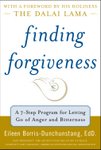We face many challenges regarding forgiveness in our lives. Turn on the news and the question of forgiveness seems to be everywhere. We are confronted with how to deal with the Bernie Madoff’s of the world and more recently issues of infidelity concerning Tiger Woods. Incidents happen on a daily basis and we all have something to say about them. So I have decided to start a column “Forgiveness and the Person of the Week,” not that we should forgive these characters, but to learn something hopefully about forgiveness and ourselves, and how to apply forgiveness in our own lives.
The buzz this week seems to be about Brit Hume and Tiger Woods. In case you missed it, Hume made the following comment on Fox News concerning Tiger Woods. Hume said "He (Tiger Woods) is said to be a Buddhist. I don’t think that faith offers the kind of forgiveness and redemption that is offered by the Christian faith. My message to Tiger would be, ‘Tiger, turn to the Christian faith and you can make a total recovery and be a great example to the world."
Suddenly there was a flurry of activity on the internet. Some people where outraged, others took sides. As I stood back and watched what was going on I had to ask myself, what is this fight really about? Granted, there are issues here and the way people reacted indicated that there were issues within us as well.
People were attacking what Brit Hume said, some either for or against Christianity. The reason we attack others is because there is something inside of us which needs to be healed. Pain is something that most of us try to avoid, yet if we are going to practice forgiveness, implicit in this is experiencing our wholeness. As in any healing work, we begin by getting in touch with what we have denied. The problem is that we are totally unaware that what bothers us so much about others is what we find most disturbing about ourselves. Since facing painful emotion about ourselves is so incredibly difficult and painful we unconsciously look for something outside of ourselves which becomes our psychological dumping grounds.
Carl Jung, a very prominent 20th century psychoanalyst called this our “shadow” or the “dark” side of personality. It functions as an inner opponent whom we struggle throughout our lives. What makes some part of our nature shadow is not its destructiveness per se; it is the fact that we are unconscious of it. The shadow has an emotional charge and presents a significant moral opposition to the ego-personality. Owning our shadow is a critical step for in not owning those aspects we begin a process of separation. We begin to see the world as good or bad, us or them. For example, when these judgments are superimposed on religious, racial, cultural or national differences, we get bigotry, racism, and the prejudices that separate and antagonize deepening the schism between us versus them. As a result, we can only see those unacceptable parts in others, and not in ourselves setting up situations of discrimination, scapegoating, victimization and even war.
Back to Brit Hume, he taught us an important lesson. Sure it is ok to have opinions but when it takes the form of an attack and we can’t seem to let go of it, then we have to ask ourselves – what are we accusing this man of? The answer we give is an indication of what needs to be healed within ourselves. The content of course will be different, but the form will be the same. In other words, we may not tell others to convert from one religion to another but we may tell people what political views they need to have. If we are willing to look at ourselves in this way and recognize that we are all capable of doing similar things then not only can we forgive ourselves, we can extend forgiveness to others for whatever we think they have done.
Only Hume knows for sure why he made his comments. Perhaps it was because of a life experience such as the death of his son in 1998 where Hume found a life preserver in faith and which he was offering it to another drowning man. We don’t really know, yet it is very interesting to watch our own behavior.
Sunday, January 10, 2010
Subscribe to:
Post Comments (Atom)



2 comments:
Another amazing post, Eileen. That dark side, or our "pain body" as Eckhart Tolle explains it, comes from so many corners. We mask mean-spirited remarks in "constructive criticism" and we make blanket statements that suck the beauty out of differences. When will we learn? I guess if we keep listening to you...and reading your blog...it will be a great beginning!
Mimi, it is interesting to watch what is going on, how it is much easier to point fingers than to take responsibility for oue emotional lives and your right we cloak so much in "constructive critism." I am afraid that within our society we cloak a lot of things such as "justice" when sometimes it sanctions the opposite.
Post a Comment